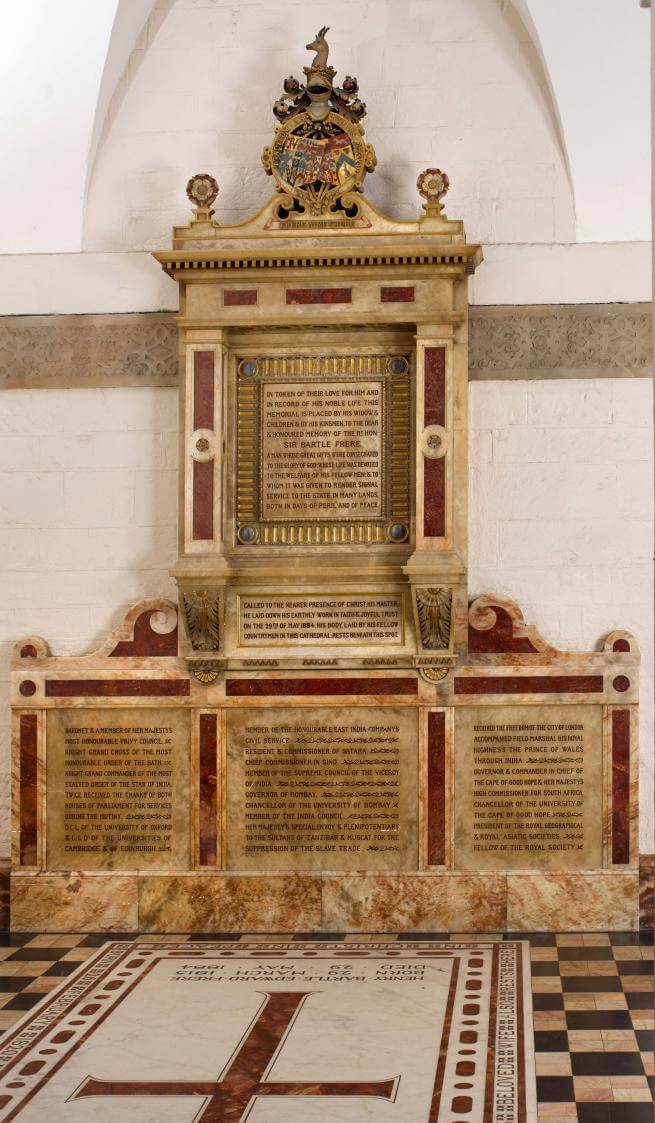Sir Henry Bartle Frere, 1st Baronet (1815-84)

Image courtesy of Pantheons: Sculpture at St Paul's Cathedral.
Sir Henry Bartle Frere
1st Baronet (1815-84)
This work is part of The East India Company at St Paul’s: A digital trail produced in collaboration with Stepney Community Trust.
Written by Sanchita Mukherjee, a traveller by heart and a photographer by nature. She has lived in a dozen countries and appreciates how much we all have in common and how our histories are intertwined.
The following text is available in Bengali, Gujurati, Urdu, Hindi, Punjabi, and Tamil. Please email CollectionsDepartment@stpaulscathedral.org.uk to request a copy.

![]()
Sir Henry Bartle Frere was educated at an East India Company college and went on to become an administrator for the Company before being appointed Governor of Bombay (Mumbai) during the British Raj, as well as Governor of Cape Colony, now in South Africa. A shrewd civil servant and colonial administrator, his actions can best be understood in light of his firm belief in the close relationship between Christianity, commerce, and civilisation.
Frere helped to suppress local uprisings against the British during the Indian Mutiny of 1857, and played a key role in installing a postal system and building road and rail networks in Western India and in the port city of Karachi in present-day Pakistan. These actions led to his rise in India: his many titles and appointments in India are listed in this monument.
Funded by Indian taxation, the Indian railways and ports made it easier, cheaper and quicker to move goods around the country and out of it. They also made it easier to move soldiers across the country, in order to put down rebellions. Bartle Frere was himself interested in the development of railways in Sind and western India for this reason. Contemporary Indians, however, criticised the British government spending Indian taxpayer money on expensive railway-building projects, and argued that they brought little benefit to Indians themselves. Indian leaders argued instead for more investment in irrigation, which would help the vast majority of Indians, who were farmers. The railways transformed India’s international trade, turning it into an exporter of raw materials, including food crops, and importer of manufactured goods, mainly from Britain. By the early 1900s, Karachi had become the largest grain-exporting port of the British Empire. The economist Angus Maddison has demonstrated that India's share of the world income went from 27% in 1700 (compared to Europe's share of 23%) to 3% in 1950 – in other words, from the second largest economy in the world to one of the poorest.
In Africa, Frere’s opposition to slavery was built on a Christian position. Frere threatened the Sultan of Zanzibar, Barghash bin Said, with total blockade until he agreed to sign an agreement abolishing the slave trade in the region. But he also waged wars of aggression in Southern Africa. Scholars have described him as a ‘violent conqueror of African peoples’ and ‘the Empire’s leading warmonger’, and he is remembered as the man who started the Zulu War that led to the deaths of tens of thousands of African people. The military and humanitarian disaster at the Battle of Isandlwana, waged by Frere against the Zulu Empire, led to his humiliating return to Britain and dealt a permanent blow to his reputation.
A controversial man appointed to govern in an exploitative empire, Frere could be an opponent of slavery while simultaneously viewing Indians and Africans as expendable resources and useful labourers to expand the power of the British Empire. Frere encouraged the migration of Indian labourers to Natal, in present-day South Africa, under contracts of indenture, in order to address post-emancipation labour shortages. And, crucially, Frere argued that Indians from certain classes could serve as useful intermediaries to help white officials maintain control over embittered African subjects. Frere’s schemes reveal the links that were deliberately forged between India and Africa to extend British commercial and political interests. Being anti-slavery didn't mean anti-colonialist or anti-racist.
For detailed information about this monument, visit the Pantheons: Sculpture at St Paul's Cathedral website.

The East India Company at St Paul's
Explore the full digital trail produced in collaboration with Stepney Community Trust.




